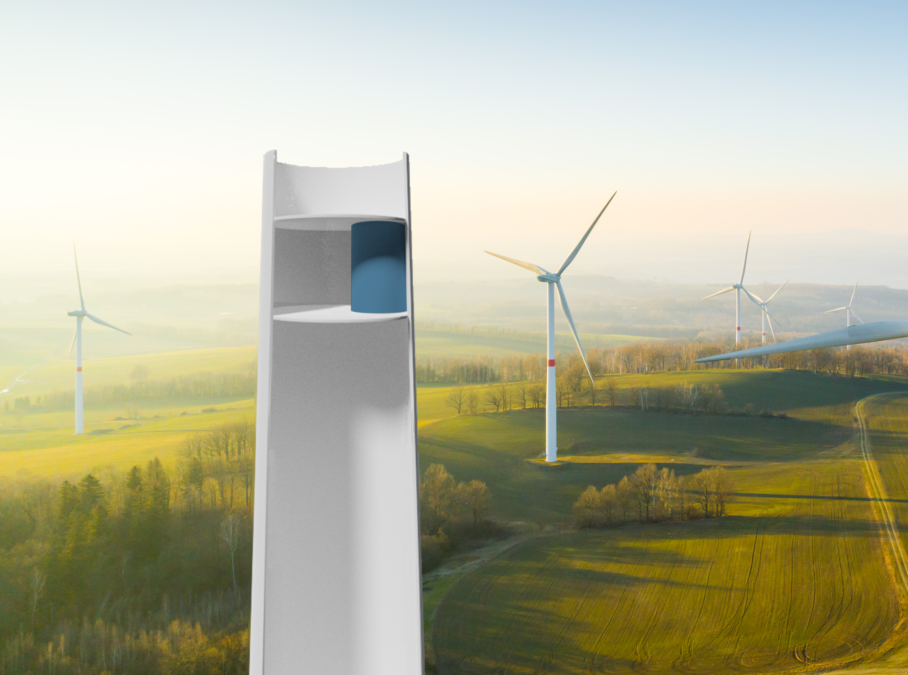Wind turbine: VIV during tower installation
The case
This page describes a typical case of tall onshore wind turbine installation. A wind turbine tower is a cylindrical steel tube, which stands free in the wind from the time the tower is erected, until the nacelle and blades can be attached.
The tower is essentially a long steel spring, and once it gets going, it will continue to vibrate for a long time.
These are just the perfect conditions for Vortex Induced Vibrations (VIV).

The Tower
The tower is $150\mathrm{m}$ tall with a top diameter of $5\mathrm{m}$. The whole tower weighs $420\mathrm{tons}$. We are concerned with mode 1 vibrations (see the figure).
The vibration happens at the frequency $f=0.5\mathrm{Hz}$. The structural damping is low for a steel tower with $\delta=2\%$.
Assessed impact of VIV
The following example calculations uses the methods introduced in our
article on VIV, based on the Eurocode EN1991-1-4:2007 (method 2).
The critical wind speed is determined to be
$U=14 \mathrm{\frac{m}{s}}$
This is a pretty low wind speed 150 m above the ground.
So it is not safe to assume that wind speeds close to the critical value will not occur during installation.
Below, we look into what will happen if winds near the critical speed do occur. Be aware that this can happen without any prior warning.
Magnitude and effect of the vibrations without mitigation
Based on the tower parameters, the Scruton number (which characterizes the effective tower damping, see the article) is $\mathrm{Sc}=2.6$. This is quite a low value, so the tower can be expected to vibrate continuously with significant amplitudes for extended periods of time.
Based on the Eurocode, the peak amplitude is found to be $2.5\mathrm{m}$. The corresponding acceleration felt in the tower would be 2.5 times stronger than gravity!


Any employee in the tower would be in grave danger with no possible counteraction before the vibrations subside. Such events have been known to last up to about 1 hour.
Furthermore, in the lucky situation that the tower is unoccupied, there is significant risk of damage to equipment and fatigue damage to the tower and foundation, which will reduce the lifetime of the wind turbine.
In conclusion, the risk to personnel and equipment is high, and countermeasures are strongly recommended!

The red dot indicates the wind turbine tower without additional damping, which will vibrate with peak amplitudes up to 2.5 m. The green dot indicates the tower with the proposed TMD, with a reduced peak vibration amplitude of 0.14 m.
Proposed countermeasures and their effect
As discussed in our article on VIV, the most reliable and cheapest countermeasure is often the installation of a Tuned Mass Damper (TMD).
For this tower, a TMD of mass 1 tonne is proposed, for example in the shape of a pendulum attached to dashpots.

This damper will be able to increase the Scruton number significantly, thus dramatically reducing the vibration amplitude.
Using our knowledge of TMD design together with the Eurocode VIV model, the peak amplitude of the tower will be $0.14\mathrm{m}$ corresponding to a felt horizontal acceleration 14% as strong as gravity.
These vibrations do not pose a great threat to personell safety and equipment. Note that work may still need to be interrupted for a brief period, and that motion sickness can occur.
In conclusion, the proposed solution bring the vibrations to a tolerable level, although vibrations will still have to be acocunted for.
Share



